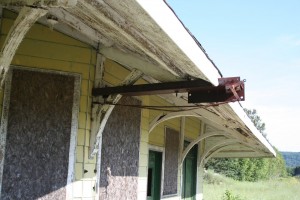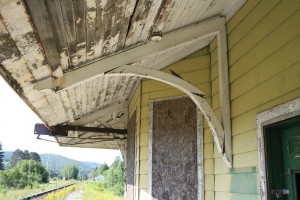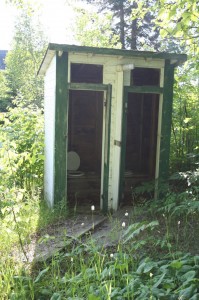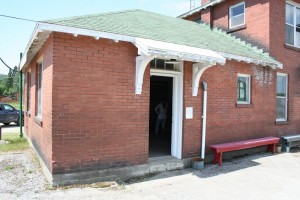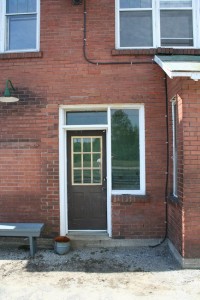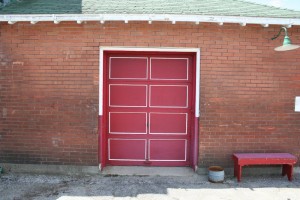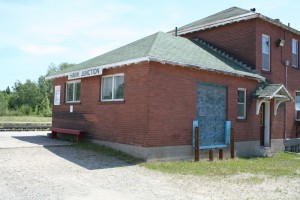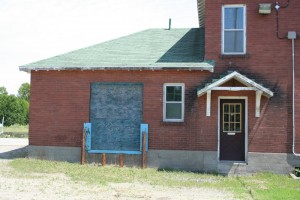A few weeks ago, I took a bit of a railfanning vacation to Northern Ontario, hitting the former Algoma Central, Huron Central and Ontario Northland. I planned part of my route to pass through Wawa and Hawk Junction on the way from Sault Ste. Marie up towards Cochrane on the Ontario Northland. This part of the trip was scheduled such as to catch the southbound regular passenger train from Hearst to Sault Ste. Marie. This train now runs on a three times a week schedule and boards near the shops at Steelton Yard rather than the downtown station at Sault Ste. Marie.
On arrival at Hawk, the first thing that struck me was how empty it was. Only a single empty pulpwood flatcar sat in the south yard in front of the station. The old enginehouse appears to be used by MOW crews now, as locomotives are no longer serviced at Hawk Junction.

I arrived shortly before the train was scheduled to arrive at Hawk Junction, but typically it was running a little late. Shortly after I arrived I heard them giving track releases around mile 195 (near Franz). So I had my lunch while waiting, and walked around the station taking photos of the building and the area, since I plan to model this location someday. While waiting for the passenger train, a short (only 9 cars) freight arrived from the Sault and tied down on one of the yard tracks to await the passenger train’s arrival.
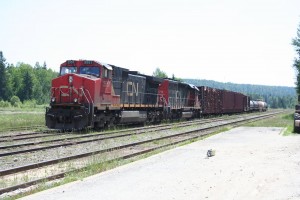
Finally at about 1:30pm the passenger pulled into the station, loaded a trio of canoers and their gear and continued south:
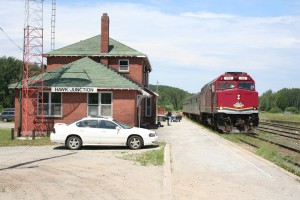
The full consist of this train was:
CN 106 (F40PH)
AC 312 (Baggage)
AC 5654 (Coach)
The F40PH was acquired in 2009 by CN from the Rio Grande Ski Train along with the coaches now used on the Agawa Canyon Tour Train. The baggage car and coach on this train are both ex-Amtrak cars acquired in 2007 with government assistance to upgrade the regular passenger service. The F40PH locomotives carry CN reporting marks over the numbers, but all of the passenger rolling stock carries AC numbers. Most however, do not actually indicate the Algoma Central name. The only car I saw in service that weekend with the actual Algoma Central name displayed was Diner 506 on the tour train. However at least one of the older ex-VIA/CN baggage cars and one ex-VIA/CN coach in the previous Algoma Central paint scheme were observed (from a distance) in front of the shops at Steelton yard, as well as private car Agawa which all proudly display the Algoma Central name.
After the passenger train departed, the crew of the freight reboarded and pulled past the Hawk Junction station to do some light switching:
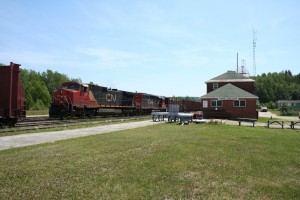
The freight would drop off the loaded pulpwood flatcar as well as the second unit which was apparently having some technical issues.

After lifting the empty pulpwood flat that had been sitting there, the train continued north:
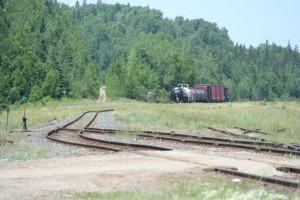
Note the general emptiness of the above photo. In the background at left is visible the abandoned roadbed of the former Michipicoten subdivision to Wawa and Michipicoten. The large grassy area to the right is the former north yard, which was the main classification yard at Hawk Junction. Now most of those tracks have been torn out and the area is becoming overgrown by tall grass.
Now compare to these 1994 photos from Hawk Junction found online:
http://www.flickr.com/photos/cklx/516522858/
http://www.flickr.com/photos/cklx/5906307892/
http://www.flickr.com/photos/cklx/746537965/
And a 1977 shot from Ted Ellis’s site showing the Hawk operator checking car numbers on an arriving ore train from the Michipicoten branch against a switch list:
http://algomacentral.railfan.net/images/AlgoCenRy/AC_Perry_Wilson_Hawk_5-21-1977.jpg
Today, even the trees on the north side of the station have recently been cut down.
